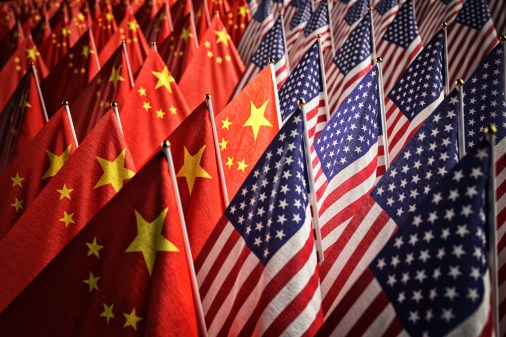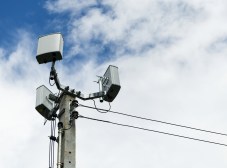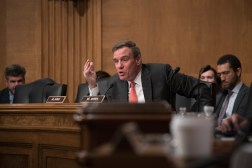Sen. Warner: Pentagon tech spending should be ‘reexamined’ post-COVID

The Pentagon needs to reevaluate its investments in legacy technology platforms with government spending expected to be curtailed as it deals with the ongoing coronavirus pandemic, said Sen. Mark Warner, D-Va.
Cybersecurity and satellites — not traditional military hardware like ships, planes and tanks — require more targeted investment if the U.S. is to compete with “the greatest threats we face” in an emerging China and disruptive Russia, said Warner, the vice chairman of the Senate Select Committee on Intelligence.
While Warner is hopeful Congress can pass another COVID-19 stimulus bill before Thanksgiving, the pandemic saw the federal deficit reach $3.1 trillion and the national debt $27.2 trillion in fiscal 2020. Future defense spending will likely be limited as a result.
“Everybody agrees with that macro point until you then get to the micro point of: Alright, which parts of that budget are you willing to take out?” Warner said during a Professional Services Council event Tuesday. “I do think some of our legacy platforms need to be reexamined.”
China has made “huge investments” in 5G, artificial intelligence and quantum computing, while the U.S. government has struggled to even identify spectrum for 5G, he added.
Warner urged PSC’s contractors to avoid Chinese telecommunications equipment and to prod the U.S. government to make more 5G spectrum available and pass legislation funding open radio access networks (O-RANs). The senator has a bill out that would invest $1.5 billion in O-RANs, which he says will push 5G network design from being hardware- to software-based — a strength of U.S. contractors.
The U.S. lags in 5G competition with China’s Huawei. American 5G companies Ericsson, Nokia and Samsung can’t compete with a company that gets $100 billion in backing from the Chinese government so it can undercut prices, Warner said.
An “alliance of the willing” is needed between the U.S. and its allies in Europe, Japan, South Korea, India, and Israel to pool resources and possibly financing for 5G, AI, quantum computing and facial recognition research and development, Warner said. That way Western companies can compete with Chinese ones.
“Many of them are quite good, but at the end of the day they are not loyal to their shareholders,” Warner said. “They are loyal to the Communist Party of China, which in my mind makes them a national security threat.”
Shutdown and transition concerns
The senator also committed to backing Section 3610 of the Coronavirus Aid, Relief, and Economic Security (CARES) Act — which allows agencies to reimburse contractors for paid leave — “as long as COVID is out there.”
The government’s pandemic response “has not been world class,” a national testing program is still lacking, and an appropriations package or continuing resolution may soon be needed to avoid a government shutdown, Warner said. Warner called continuing resolutions “acts of stupidity,” but President-elect Joe Biden assuming office could avert a shutdown.
While the election has been called for Biden, Warner was unsure of a string of Trump lawsuits contesting the vote.
“Obviously I’m hopeful that Joe Biden will be the next president,” Warner said. “But it looks like we’ve still got a ways to go.”






